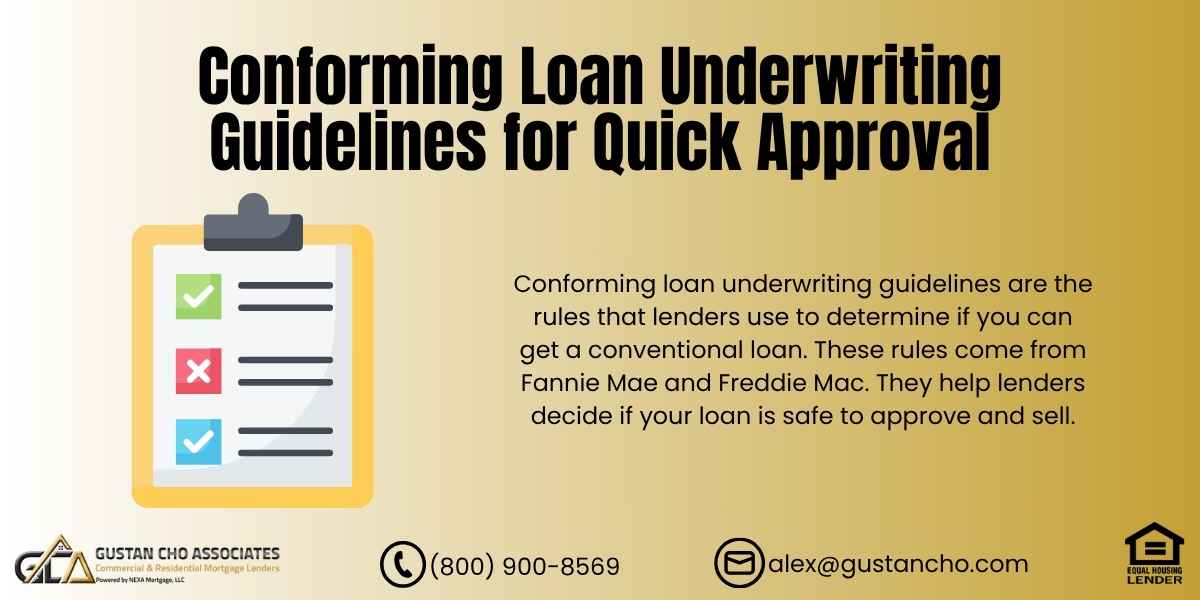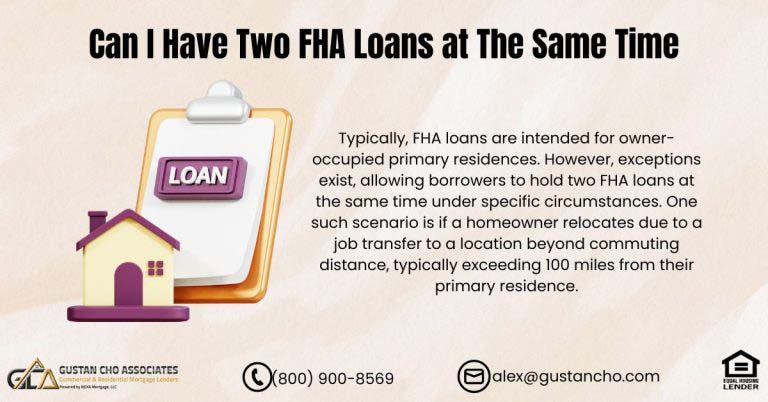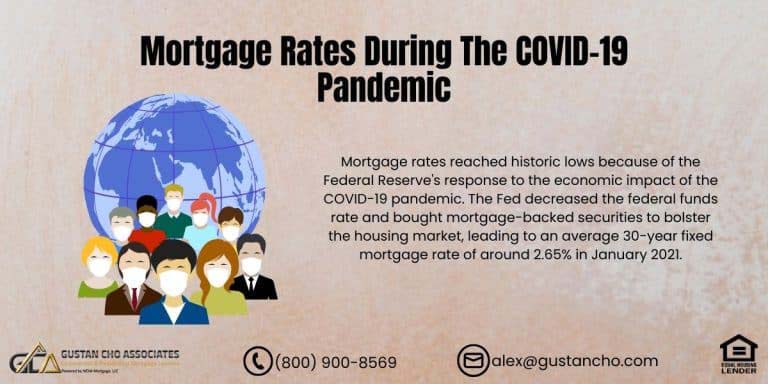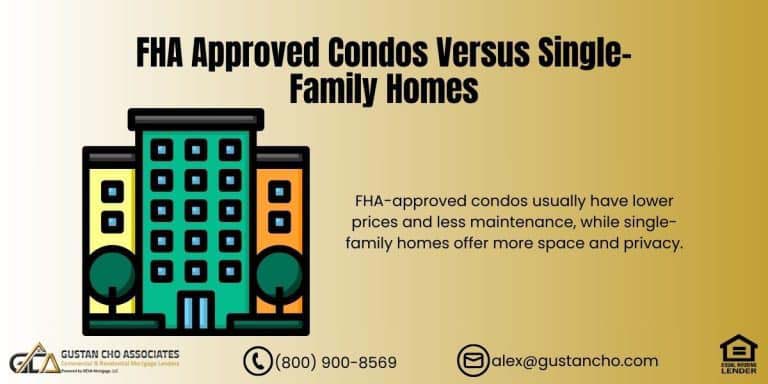Conforming Loan Underwriting Guidelines: What You Need To Know in 2025
If you’re considering buying a home and want a mortgage with the best rates, you’ve likely come across the term conforming loan underwriting guidelines. These rules significantly affect whether you get approved and how much house you can afford.
At Gustan Cho Associates, we specialize in helping borrowers understand the loan process so you can get approved quickly, even if you’ve been turned down elsewhere. This guide breaks down everything you need about conforming loan underwriting guidelines.
What Are Conforming Loans?
A conforming mortgage is a type of loan that follows the rules set by Fannie Mae and Freddie Mac, which are government-backed organizations. These agencies buy mortgages from lenders instead of providing loans directly. For a mortgage to be sold to them, it must meet specific guidelines.
This is important because lenders are more inclined to provide lower interest rates, smaller down payments, and better terms when they know they can sell the loan later. That’s why many first-time homebuyers prefer conforming mortgages.
In summary, a conforming loan, explained for first-time homebuyers, means understanding that these loans often come with better conditions due to their eligibility for sale to Fannie Mae and Freddie Mac.
Get Approved Faster With Conforming Loan Guidelines
Know the rules, skip the delays—follow agency-approved underwriting steps for a fast approval.
Are Conforming Loans Government-Backed?
No. Conforming loans are not backed by the government like FHA, VA, or USDA loans. But they’re still very popular—especially for borrowers with decent credit, steady income, and a moderate down payment. Because these loans follow conforming loan underwriting guidelines, they offer peace of mind to both lenders and borrowers.
Why Underwriting Guidelines Matter
Every loan goes through underwriting, which is when a lender checks your credit, income, debt, and assets to make sure you qualify. For a loan to be “conforming,” the underwriter must follow a very specific set of rules: the conforming loan underwriting guidelines.
The rules outlined determine several important factors regarding home buying, including the amount of house you can afford, what constitutes income, which debts need to be factored in, and the necessary credit score required for consideration. Knowing these guidelines can help you avoid surprises and get a faster approval.
For instance, if you’re aware of the required credit score and ensure your score is above the threshold before applying, you could avoid lengthy delays in the approval process. This means that when you find your dream home, you’ll be better prepared to act quickly and secure your loan, thereby reducing the risk of losing out to other buyers who are ready to move forward.
Updated 2025 Conforming Loan Limits
As of 2025, the standard loan limit for most areas in the U.S. is set at $766,550, while in high-cost regions, it can rise to $1,149,825. If you need to borrow beyond these amounts, you’ll need a jumbo loan, which comes with stricter requirements and higher interest rates.
It’s important to note that the loan limit refers to the loan amount, not the purchase price. If you want to know the specific limits for your county, be sure to check the county-by-county breakdown of the 2025 conforming loan limits. By adhering to these limits and conforming loan underwriting guidelines, you can benefit from easier approvals and reduced costs.
Key Conforming Loan Underwriting Guidelines for 2025
Here are the most important conforming loan underwriting guidelines you should know before applying for a conventional loan:
1. Credit Score Requirements
Most conforming loans typically need a minimum credit score of 620. But the truth is, the higher your score, the better your rates and terms will be. At Gustan Cho Associates, we team up with borrowers who are just at that minimum and help them boost their scores for even better deals.
2. Debt-to-Income (DTI) Ratio
Your DTI ratio compares your monthly debts to your gross income. Fannie Mae and Freddie Mac generally cap this ratio at 45%. But you can go up to 50% if you have strong compensating factors, like a good credit score or a decent amount of savings.
Underwriters must follow these DTI limits per conforming loan underwriting guidelines.
3. Down Payment Requirements
You can get a conforming loan with as little as:
- 3% down if you’re a first-time homebuyer or using special programs
- 5% down for most other borrowers
- A 20% down payment is required if you wish to steer clear of private mortgage insurance (PMI).
Conforming loans offer flexible down payment options, making them ideal for buyers who want to keep cash in savings.
4. Student Loan Guidelines
As of 2025, the standard loan limit for most areas in the U.S. is set at $766,550, while in high-cost regions, it can rise to $1,149,825. If you need to borrow beyond these amounts, you’ll need a jumbo loan, which comes with stricter requirements and higher interest rates.
It’s important to note that the loan limit refers to the loan amount, not the purchase price. If you want to know the specific limits for your county, be sure to check the county-by-county breakdown of the 2025 conforming loan limits. By adhering to these limits and conforming loan underwriting guidelines, you can benefit from easier approvals and reduced costs.
5. Community Property States
If you live in a community property state (like California, Texas, or Arizona), your non-borrowing spouse’s debts do not need to be included in your DTI when applying for a conforming loan. That’s excellent news for married buyers.
FHA loans, by comparison, do include a spouse’s debts even if they’re not on the loan.
Following conforming loan underwriting guidelines can make it easier to qualify if your spouse has high debt.
**Understanding this topic can be tricky, leading to misconceptions. Borrowers often ask, “Does my spouse’s credit matter at all?” It’s important to clarify: your spouse’s credit isn’t assessed unless they are on the loan. However, some of their debts or obligations can still influence your household finances. To address the question, “Do I have to include spouse debt on a conventional mortgage?” the answer is no, not if they aren’t part of the loan application.
6. Mortgage Included in Bankruptcy
If you have previously filed for Chapter 7 or Chapter 13 bankruptcy and included a mortgage, you may still have options for obtaining a conforming loan. According to underwriting guidelines, you can qualify for a new loan just 4 years after the discharge date of your bankruptcy, even if a foreclosure occurred afterward.
This flexibility is more accommodating than FHA loans, which typically consider the foreclosure date. If you’ve faced financial difficulties but have since stabilized your finances, pursuing a conforming loan could be an excellent opportunity for you.
7. Non-Occupant Co-Borrowers
Conforming loans allow non-occupant co-borrowers (also called co-signers) to help you qualify, even if they don’t live in the home.
Unlike FHA loans, your co-signer doesn’t need to be a family member. They can be friends, business partners, or anyone willing to help.
This flexibility is why many borrowers choose loans following conforming loan underwriting guidelines.
Want a Fast Mortgage Approval? Stick to Conforming Guidelines
Fannie Mae and Freddie Mac guidelines make it easier to get approved—if you know how to use them.
What Documents Do I Need?
Here’s what most underwriters will ask for when following conforming loan underwriting guidelines:
- Recent pay stubs (last 30 days)
- W-2s (last 2 years)
- Tax returns (if self-employed or using rental income)
- Bank statements (last 60 days)
- Photo ID
- Credit report (pulled by lender)
Being organized with your paperwork can significantly affect how fast you get approved.
What If I Don’t Meet These Guidelines?
Don’t panic. Many borrowers are told “no” by big banks, only to be approved by us.
At Gustan Cho Associates, we don’t have lender overlays—extra rules that some banks add on top of the standard conforming loan underwriting guidelines. We follow agency guidelines to the letter, which means we can often approve you even if other lenders say no.
Conforming vs. FHA: Which Is Better?
Let’s say you’re torn between an FHA loan and a conforming loan. Here’s how they compare:
| Feature | Conforming Loan | FHA Loan |
| Minimum Credit Score | 620 | 580 (or even 500 with 10% down) |
| Down Payment | As low as 3% | 3.5% minimum |
| PMI | Cancellable | Usually for life |
| Income Flexibility | More strict | More forgiving |
| Student Loan Rules | IBR accepted | Also accepts IBR (as of recent update) |
| Spouse’s Debts Count? | No (in community property states) | Yes |
A conforming loan might save you money in the long run if you have a decent credit score and steady income.
Why Work With Gustan Cho Associates?
We’re not your typical mortgage lender. At Gustan Cho Associates, we:
- Offer conforming loans with no overlays
- Approve loans that banks and credit unions often reject
- Move fast—we can close most loans in 21 days or less
- Are licensed in 50 states, D.C., Puerto Rico, and the U.S. Virgin Islands
Our job is to make sure you get approved, not denied. We walk you through the conforming loan underwriting guidelines and explain every step of the way.
Final Thoughts: Get Approved With Confidence
Understanding conforming loan underwriting guidelines can feel overwhelming, but it doesn’t have to be. With the right team, the right loan, and a clear plan, you can become a homeowner even if your situation isn’t perfect.
Whether you’re just starting your home search or you’ve already been denied by another lender, Gustan Cho Associates is here to help. Borrowers who need a five-star national mortgage company licensed in 50 states with no overlays and who are experts on conforming loan underwriting guidelines, please contact us at 800-900-8569, text us for a faster response, or email us at gcho@gustancho.com.
Quick Mortgage Approvals Start With the Right Guidelines
Conforming loan programs offer clear, flexible rules for smooth underwriting and faster closings.
Ready to Get Started?
Let’s make your dream of homeownership happen—without lender overlays, surprises, or delays. Talk to us about conforming loan underwriting guidelines and how you can get approved today.
Frequently Asked Questions About Conforming Loan Underwriting Guidelines:
What are Conforming Loan Underwriting Guidelines?
Conforming loan underwriting guidelines are the rules that lenders use to determine if you can get a conventional loan. These rules come from Fannie Mae and Freddie Mac. They help lenders decide if your loan is safe to approve and sell.
What Credit Score do I Need Under Conforming Loan Underwriting Guidelines?
Most conforming loans require at least a 620 credit score. But if your score is higher, you’ll usually get better rates and terms. Lenders follow this rule as part of the conforming loan underwriting guidelines.
How Much Income or Debt Can I have to Qualify?
The conforming loan underwriting guidelines say your monthly debts should not exceed 45% to 50% of your gross monthly income. This is called your debt-to-income (DTI) ratio.
Can I Buy a House with Just 3% Down Using These Guidelines?
Yes! The conforming loan underwriting guidelines allow 3% down if you’re a first-time buyer, and 5% down for most others. You can even avoid mortgage insurance by putting 20% down.
Do Conforming Loan Underwriting Guidelines Count My Spouse’s Debts?
If you live in a community property state, conforming loan underwriting guidelines do not count your non-borrowing spouse’s debts in your DTI. This helps more couples qualify.
What if I have Student Loans? Can I Still Get Approved?
Yes. If your student loan is in an Income-Based Repayment (IBR) plan, the conforming loan underwriting guidelines allow underwriters to use the payment shown on your credit report, even if it’s only $25 monthly.
What Happens if I had a Bankruptcy or Foreclosure in the Past?
Under conforming loan underwriting guidelines, you can get a new loan 4 years after a bankruptcy discharge, even if you had a foreclosure included. That’s more flexible than many other loan programs.
Can Someone Co-Sign for Me on a Conforming Loan?
Yes. Conforming loan underwriting guidelines allow non-occupant co-borrowers—like friends or family—to help you qualify, even if they won’t live in the home with you.
What Paperwork do I Need to Meet Conforming Loan Underwriting Guidelines?
You’ll need to show recent pay stubs, W-2s, bank statements, tax returns (if self-employed), a photo ID, and allow your lender to pull your credit report. Being prepared can speed things up.
What if Another Lender Said I Don’t Qualify?
Don’t give up. Some lenders add extra rules called overlays. At Gustan Cho Associates, we follow only the standard conforming loan underwriting guidelines, so we might say “yes” when others say “no.”
This blog about “Conforming Loan Underwriting Guidelines for Quick Approval” was updated on December 19th, 2025.
Conforming Loan? Quick Approval Starts Here
Understand the key underwriting criteria for a smooth, hassle-free mortgage process.










